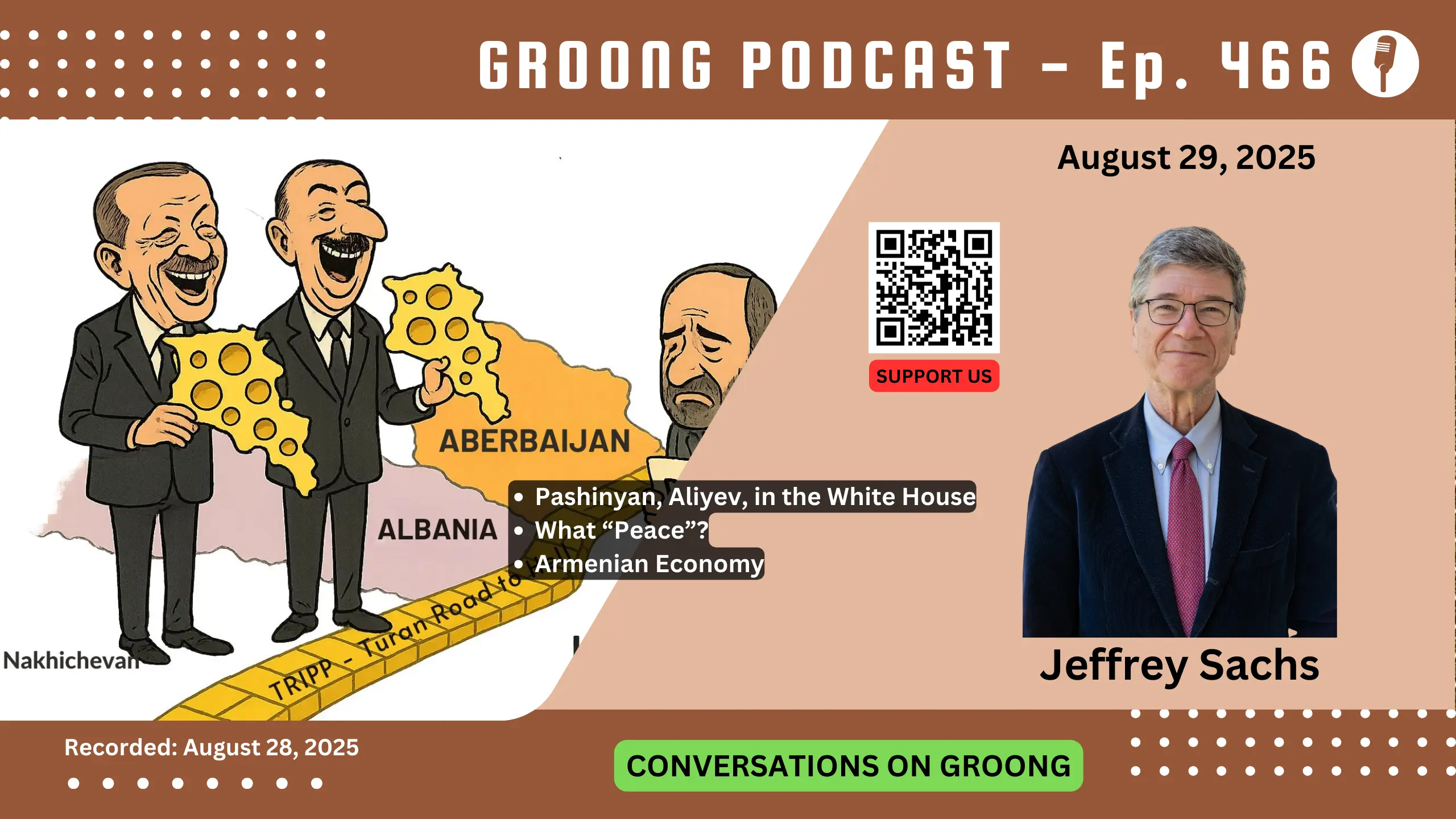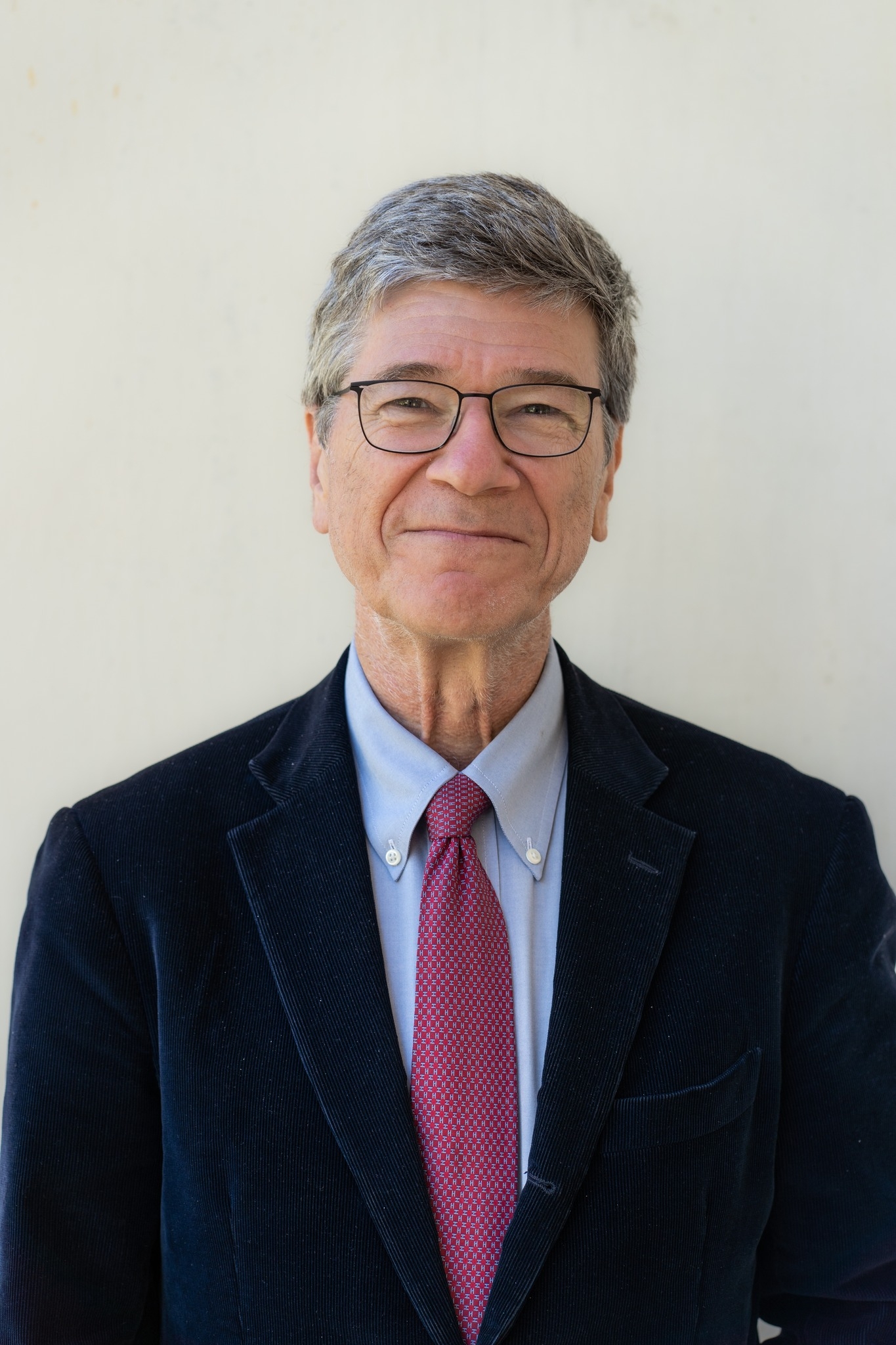Jeffrey Sachs - TRIPP Down Zangezur Corridor | Ep 466, Aug 29, 2025 [EP466]
Posted on Friday, Aug 29, 2025 | Category: Armenia, Geopolitics | Series: cog, video
Groong Links:
Guest:
Topics:
- Pashinyan, Aliyev, in the White House
- What “Peace”?
- Armenian Economy
Episode 466 | Recorded: August 28, 2025
Show Notes
In this episode of Conversations on Groong, renowned economist Jeffrey Sachs joins to discuss the U.S.-brokered “TRIPP” (Trump Route for International Peace and Prosperity), also known as the Zangezur Corridor. The discussion covers the risks of foreign powers imposing corridors through Armenia, the muted response from Moscow, Tehran’s strong opposition, and what this means for regional security. Sachs stresses that Armenia should not look to distant powers like the United States for security or stability, but instead pursue prudent arrangements and economic cooperation with its immediate neighbors—Russia, Iran, Turkey, Georgia, and Azerbaijan. He also gives candid advice on Armenia’s economy, its dependence on Russia, and the long-term challenges of EU aspirations.
Main Topics Addressed
- The Oval Office meeting of Pashinyan, Aliyev, and Trump and the TRIPP/Zangezur Corridor agreement.
- Risks of Armenia being drawn into great power struggles through U.S. involvement.
- The absence of security guarantees or right of return for Armenians from Karabakh.
- Azerbaijan’s growing alignment with Israel and implications for Armenia.
- Sachs’s view that Armenia must find solutions with its regional neighbors, not distant powers.
- Armenia’s recent economic growth, its dependence on Russia, and long-term risks.
- Sachs’s recommendations for Armenia’s economic and diplomatic strategy.
Key Questions Discussed
- How could the TRIPP/Zangezur Corridor bring peace, or instead trigger war?
- Why has Moscow’s reaction been muted, while Tehran remains strongly opposed?
- What are the dangers of U.S. military or paramilitary involvement in Syunik?
- Is peace possible without security guarantees and a right of return for Karabakh Armenians?
- Can Armenia rely on U.S. or European support, or must it seek security through regional diplomacy?
- How sustainable is Armenia’s recent economic growth tied to re-exports and remittances?
- What macroeconomic and diplomatic policies should Armenia adopt for long-term success?
Referenced Articles & Sources
Wrap-up
Don’t forget to support us:
That’s our show! We hope you found it useful. Please find us on Social Media and follow us everywhere you get your Armenian news.
Thanks to Laura Osborn for the music on our podcasts.
Guests

Jeffrey Sachs
Prof. Jeffrey Sachs is a world-renowned economics professor, bestselling author, innovative educator, and global leader in sustainable development.
Sachs is widely recognized for bold and effective strategies to address complex challenges including the escape from extreme poverty, the global battle against human-induced climate change, international debt and financial crises, national economic reforms, and the control of pandemic and epidemic diseases.
Sachs serves as the Director of the Center for Sustainable Development at Columbia University, where he holds the rank of University Professor, the university’s highest academic rank. Sachs was Director of the Earth Institute at Columbia University from 2002 to 2016. He is President of the UN Sustainable Development Solutions Network, Co-Chair of the Council of Engineers for the Energy Transition, academician of the Pontifical Academy of Social Sciences at the Vatican, Commissioner of the UN Broadband Commission for Development, Tan Sri Jeffrey Cheah Honorary Distinguished Professor at Sunway University, and SDG Advocate for UN Secretary General António Guterres. From 2001-18, Sachs served as Special Advisor to UN Secretaries-General Kofi Annan (2001-7), Ban Ki-moon (2008-16), and António Guterres (2017-18).
Sachs has authored and edited numerous books, including three New York Times bestsellers: The End of Poverty (2005), Common Wealth: Economics for a Crowded Planet (2008), and The Price of Civilization (2011). Other books include To Move the World: JFK’s Quest for Peace (2013), The Age of Sustainable Development (2015), Building the New American Economy: Smart, Fair & Sustainable (2017), A New Foreign Policy: Beyond American Exceptionalism (2018), The Ages of Globalization: Geography, Technology, and Institutions (2020), and most recently, Ethics in Action for Sustainable Development (2022).
Sachs is the 2022 recipient of the Tang Prize in Sustainable Development and was the co-recipient of the 2015 Blue Planet Prize, the leading global prize for environmental leadership. He was twice named among Time magazine’s 100 most influential world leaders. Sachs has received 42 honorary doctorates, and his recent awards include the 2022 Tang Prize in Sustainable Development, the Legion of Honor by decree of the President of the Republic of France, and the Order of the Cross from the President of Estonia.
Prior to joining Columbia, Sachs spent over twenty years as a professor at Harvard University, most recently as the Galen L. Stone Professor of International Trade. A native of Detroit, Michigan, Sachs received his B.A., M.A., and Ph.D. degrees at Harvard.
Hosts

Asbed Bedrossian
Asbed Bedrossian is an IT professional, and for years oversaw the central IT enterprise infrastructure and services at USC. His decades of experience spanned across IT strategy, enterprise architecture, infrastructure, cybersecurity, enterprise applications, data center operations, high performance computing, ITSM, ITPM, and more.
Asbed founded the Armenian News Network Groong circa 1989/1990, and co-founded the ANN/Groong podcast in 2020.

Hovik Manucharyan
Hovik Manucharyan is an information security engineer who moved from Seattle to Armenia in 2022. He co-founded the ANN/Groong podcast in 2020 and has been a contributor to Groong News since the late 1990s.
Disclaimer: The views expressed by Hovik Manucharyan on the ANN/Groong podcast are his own and do not necessarily reflect the opinions of his employer or any other organization.